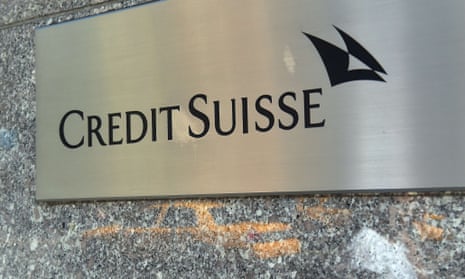Credit Suisse Group has pleaded guilty to criminal charges that it helped Americans evade taxes, becoming the first bank in more than a decade to admit to a crime in the US. It will now pay a long-expected fine of $2.5bn (£1.5bn).
“This case shows that no financial institution no matter its size or global reach is above the law,” said the attorney general, Eric Holder. He said the years-long investigation had uncovered evidence of an “extensive and wide-ranging” conspiracy to hide taxes from the Internal Revenue Service (IRS) and the bank’s involvement in it.
“The bank went to elaborate lengths to shield itself, its employees, and the tax cheats it served from accountability for their criminal actions. They subverted disclosure requirements, destroyed bank records, and concealed transactions involving undeclared accounts by limiting withdrawal amounts and using offshore credit and debit cards to repatriate funds. They failed to take even the most basic steps to ensure compliance with tax laws,” said Holder.
Holder said the bank helped account holders deceive the IRS by concealing assets and income in illegal, undeclared bank accounts. “These secret offshore accounts were held in the names of sham entities and foundations. This conspiracy spanned decades. In the case of at least one wholly owned subsidiary, the practice of using sham entities to conceal funds began more than a century ago,” said Holder.
He said hundreds of Credit Suisse employees, including at the manager level, “conspired to help tax cheats dodge US taxes”.
Brady Dougan, Credit Suisse’s chief executive officer, said: “We deeply regret the past misconduct that led to this settlement. The US cross-border matter represented the most significant and longstanding regulatory and litigation issue for Credit Suisse. Having this matter fully resolved is an important step forward for us.
He said there had been “no material impact” on the bank’s business resulting from the heightened public attention and the bank would “now focus on the future and give our full attention to executing our strategy”.
The bank will pay a total of $1.8bn in the form of a fine of over $1.13bn and nearly $670m in restitution to the IRS. It will also pay the New York State department of financial services a record $715m and another $100m to the Federal Reserve.
The deal comes after a Senate panel in February concluded Credit Suisse recruited for over 22,000 US customers with assets of $10bn-$12bn, the vast majority of which were hidden from US authorities.
Pressure has been mounting on the Swiss banks in recent months. In March, Andreas Bachmann, one of six former Credit Suisse bankers indicted on charges of helping US clients hide $4bn in assets, pleaded guilty and agreed to cooperate with prosecutors.
In April, Josef Dorig, founder of a Swiss fund, pleaded guilty in the same case and implicated several other Credit Suisse bankers.
Criminal convictions against major financial institutions are rare. The financial services industry has worried that charging a bank with a crime could shut down its entire business. The last global bank to plead guilty in the US was Crédit Lyonnais, which in 2004 admitted making false statements to the Federal Reserve.
In 2002, the accounting firm Arthur Andersen was convicted of obstruction of justice related to its auditing of Enron, the energy firm that imploded in a massive accounting scandal in 2001. That ruling was reversed on appeal but was enough to destroy the company.
Regulators have subsequently been wary of criminal convictions of holding companies and have instead reached plea agreements with banks including HSBC, JPMorgan Chase and UBS or have extracted guilty pleas from subsidiaries.
Holder said the agreement had been struck “in close coordination with the bank’s financial regulators” because “criminal charges involving a financial institution have the potential to trigger serious follow-on actions by regulatory agencies.” He said the bank would now “move forward” although he said there were other ongoing investigations.
The case has led to calls for the resignation of Dougan and the chairman of Credit Suisse, Urs Rohner. Dougan, 54, is the first American to serve as sole CEO of Credit Suisse and was appointed to the top job in 2007 after leading the investment bank. He is one of the few global bank bosses to have survived the financial crisis and the scandals that followed.
On Sunday, Christoph Blocher, billionaire industrialist and vice-president of the rightwing Swiss People’s party (SVP), told Swiss newspaper Schweiz am Sonntag that Dougan and Rohner should step down. “In my opinion, the CEO as well as the chairman of the board must go in order to save the bank,” Blocher told the Schweiz am Sonntag. His comments come after calls for Dougan’s resignation from Switzerland’s left-wing Social Democrats.
While Credit Suisse is close to finalizing a deal, the Justice Department is still pushing for an admission of criminal wrongdoing from Italy’s BNP Paribas, which is accused of having violated US sanctions against Cuba, Iran and Sudan between 2002 and 2009.




Comments (…)
Sign in or create your Guardian account to join the discussion